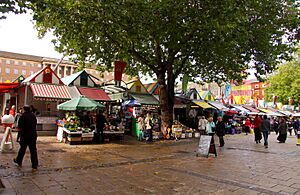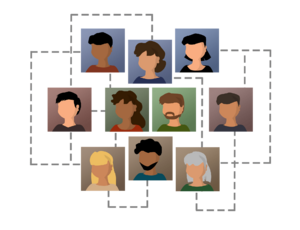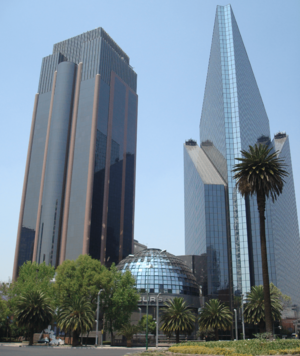Business facts for kids
A business is an activity where people make money by creating, buying, or selling things like products or services. It's basically any activity done to earn a profit.
When someone owns a business, they are usually responsible for its debts. However, some types of businesses, like a limited liability company, protect the owner from being fully responsible. The way a business is taxed can also be different from how larger companies are taxed.
People often use the words "business" and "company" to mean the same thing. But legally, they can be different. Companies, like corporations, are seen as separate legal entities from their owners. This means the owners are usually not personally responsible for the company's debts.
Most people who don't work for the government or a charity work for a business. These businesses aim to make a profit by providing value to customers. In almost every country, most jobs are found in businesses.
Contents
Different Kinds of Businesses
There are many ways businesses can be set up. Here are some common types:
Sole Proprietorship
A sole proprietorship is owned and run by just one person. This person gets all the profits but is also fully responsible for all the business's debts. This means their personal belongings could be at risk if the business owes money.
Partnership
A partnership is a business owned by two or more people. In most partnerships, each owner is fully responsible for the business's debts. There are different kinds of partnerships, like general partnerships and limited liability partnerships.
Corporation
A corporation is a separate legal entity from its owners, called shareholders. This means the owners usually have "limited liability." Their personal money is protected if the business fails. Corporations can be owned by the government or by private individuals. They can also be set up to make a profit or as a nonprofit organization.
Cooperative
A cooperative, or co-op, is a business owned and controlled by its members. Members share in the decision-making. Co-ops can be for profit or not for profit. They are often set up by consumers or workers.
Limited Liability Company (LLC)
An LLC is a type of business that protects its owners from being personally responsible for business debts. It combines some features of partnerships and corporations.
Franchise
A franchise is a business where an entrepreneur buys the right to use a larger company's name and business model. For example, many fast-food restaurants are franchises. This allows people to start a business with an already known brand.
Types of Industries
Businesses can be grouped into different industries based on what they do:
Agriculture and Mining
- Agriculture involves growing crops, raising animals, or fishing.
- Mining businesses dig up natural resources like wood, oil, gas, metals, or minerals from the Earth.
Service Businesses
Service businesses offer things you can't touch, like help or advice. They charge for the work they do. Examples include:
- Financial services like banks, credit unions, and insurance companies. They help people manage money and investments.
- Transportation businesses like airlines or shipping companies. They move goods and people from one place to another.
- Utilities provide public services like water, electricity, or waste management. These are often run by the government.
- Entertainment and Media companies make money from movies, music, books, and news. This includes film studios, TV networks, and newspapers.
- Sports organizations are involved in sports activities. They make money by selling sports-related goods and services.
Manufacturing
Manufacturers make products from raw materials or parts. They then sell these finished products for a profit. This includes making cars, medical devices, or aircraft.
Real Estate
Real estate businesses buy, sell, build, and develop properties. This includes land, homes, and other buildings.
Retail and Wholesale
- Retailers sell goods directly to customers, like stores.
- Wholesalers sell goods in large amounts to other businesses, not directly to customers. They act as middlemen between manufacturers and customers.
What Businesses Do
Businesses perform many different activities to operate successfully:
Accounting
Accounting is about keeping track of a business's money. It involves recording, organizing, and sharing financial information. Accountants help businesses understand how much money they have, how much they owe, and how much profit they are making.
Commerce
Commerce is the process of buying and selling goods and services. It includes not just trading, but also things like marketing, shipping, banking, and legal services that help trade happen.
Finance
Finance is about managing money and investments. In a business, finance ensures there's enough money for daily operations and to pay back debts. It also helps decide where to invest money to make the business grow and become more valuable over time.
Human Resources (HR)
Human Resources, or HR, is the part of a business that deals with employees. HR finds, hires, trains, and supports workers. They help make sure employees are productive and that the company follows rules about workers. HR also works to make the workplace better and solve any employee issues.
Information Technology (IT)
Many businesses have an IT department. This team helps with computers, software, and other technology. They make sure the business's computer systems work well and support its goals.
Manufacturing
Manufacturing is the process of making products. This can involve using machines, tools, and different processes to turn raw materials into finished goods on a large scale.
Marketing
Marketing is how businesses tell people about their products or services. It involves creating, communicating, and delivering things that customers will value. Marketing includes advertising and deciding how much to charge for products. With technology, digital marketing, which uses online tools, has become very important.
Research and Development (R&D)
Research and development (R&D) involves activities that help a company create new services or products. It's the first step in bringing new ideas to life. R&D can be challenging because the results are not always known in advance.
Safety
Safety in a business means protecting employees from injuries. Businesses invest in safety plans and training to prevent accidents. This helps reduce costs from injuries and keeps workers safe.
Sales
Sales is the activity of selling products or services. It's about how many items a business sells in a certain time. Sales are very important for a company to succeed and make money.
How Businesses Are Managed
Managing a business means making sure it runs smoothly and effectively. This involves handling money, resources, and people.
Owners can manage their businesses themselves, or they can hire managers to do it. Managers work with financial resources, physical assets (like buildings and equipment), and human resources (employees).
How Businesses Are Organized
The way a business is organized depends on several things:
- Size and Scope: Smaller businesses are often more flexible. Larger businesses, or those with many owners, are usually set up as corporations or partnerships.
- Legal Requirements: Some countries require certain types of businesses to be organized in specific ways.
- Taxes: Different business structures are taxed differently, which can offer advantages.
- Rules and Information: Some business types have to share more information with the public or follow more rules.
- Control: How a business is organized helps control its tasks and manage risks.
Many businesses operate as a separate legal entity, like a corporation or a partnership. This means the business is treated as its own "person" in the eyes of the law. This usually protects the owners' personal belongings if the business runs into financial trouble.
If two or more people own a business together without setting up a special legal entity, they are usually considered a general partnership. If one person owns and runs a business alone, they are called a sole proprietor.
In most countries, corporations have to pay taxes on their profits. Sometimes, this can lead to "double taxation," where the corporation pays tax, and then the owners pay tax again when they receive profits.
Laws often treat small businesses differently from large ones. They might have simpler rules or different tax benefits.
When a business "goes public" through an initial public offering (IPO), it means parts of the business are sold to the public. This usually requires the business to share a lot of information and follow strict rules.
Getting Money (Capital)
When businesses need money to grow, they can sell parts of their company, called securities. This money is called capital.
Businesses can raise capital privately or by selling shares on a stock exchange. Major stock exchanges around the world include the New York Stock Exchange, London Stock Exchange, and Tokyo Stock Exchange. Other ways to get money include bank loans or crowdfunding online.
Protecting Ideas (Intellectual Property)
Businesses often have important ideas or creations that need protection from competitors. This is called "intellectual property." It can include:
- Patents: Protect new inventions.
- Copyrights: Protect original works like books, music, or art.
- Trademarks: Protect names, logos, and brands.
- Trade secrets: Important information kept secret, like a special recipe.
Businesses often trademark their names and logos. Many countries have laws and international agreements to protect intellectual property.
Trade Unions
A trade union (or labor union) is an organization of workers who join together to achieve common goals. They work to improve things like pay, benefits (like health care), safety, and working conditions. The union's leaders talk with the employer on behalf of the workers to negotiate contracts.
Business Rules and Laws
Every country has laws that businesses must follow. These laws cover how businesses are set up, how they treat employees, and how they interact with customers.
Laws can cover many areas, such as:
- How employees are treated, including minimum wage and working hours.
- Worker safety and protection.
- Rules against discrimination based on age, gender, or other factors.
- Environmental rules to protect nature.
Some businesses need special licenses to operate, like doctors, lawyers, or businesses that sell alcohol. Local governments might also require licenses and taxes just to run a business.
Businesses that have "gone public" (sold shares to the public) have even more rules. They must share information with their shareholders and the public. In the United States, the Securities and Exchange Commission (SEC) helps enforce these rules.
Because business laws are so complex, many lawyers specialize in different areas of business law.
See also
 In Spanish: Negocio para niños
In Spanish: Negocio para niños
- Accounting
- Advertising
- Bank
- Business ethics
- Businessperson
- Capitalism
- Commerce
- Company
- E-commerce
- Economics
- Entrepreneurship
- Finance
- Franchising
- Human resources
- Innovation
- Insurance
- Intellectual property
- International trade
- Investment
- Limited liability
- Manufacturing
- Marketing
- Money
- Profit
- Real estate
- Small business
- Tax
- Trade
- Types of business entity
 | Tommie Smith |
 | Simone Manuel |
 | Shani Davis |
 | Simone Biles |
 | Alice Coachman |





